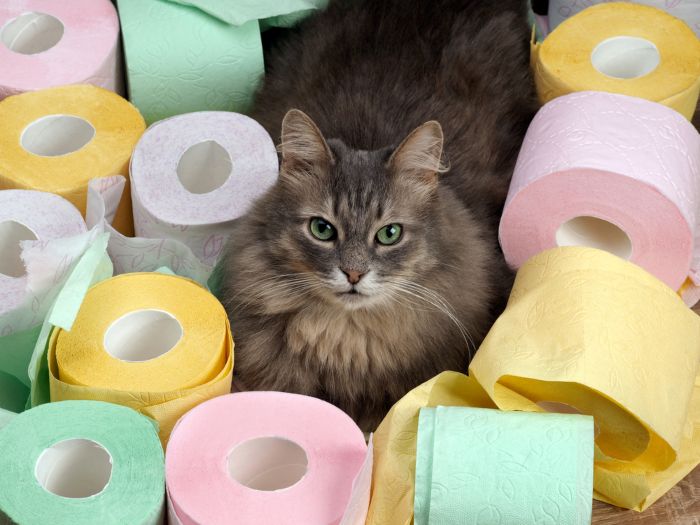

Cat diarrhea is a terrible thing for both the owner and the pet. This problem may seem harmless, but it often points to a more complex condition. In order to avoid serious health issues, you need to know about different types of diarrhea in cats and what to do if your pet develops problems with stool.
Read a Happy Garden guide about cat diarrhea.
Cat diarrhea is a digestive disorder that leads to a change in the consistency of the stool and loose bowel movements. Even though many don’t find it serious, this condition may be life-threatening since the cat loses a large amount of fluid with each act of defecation. As a result, the animal can become dehydrated.
Often, diarrhea displays signs of nausea, abdominal pain, and vomiting. In addition, your cat may experience discomfort, anxiety, and stress.
Diarrhea is commonly a symptom of other underlying pathologies.
Causes of diarrhea in cats can be classified into domestic and pathological. The former includes nutritional and other factors, while the latter – various diseases and pathologies.
So why does your pet get diarrhea?
The color of the feces can point to the possible cause of diarrhea too.
As mentioned earlier, depending on the causes, feces acquire a different color, texture, and smell. It may be possible to figure out a particular disease.
Depending on the color of the feces, the following types of diarrhea are distinguished:
A healthy cat’s poop should be brown and well-formed. Acts of defecation should be no more than twice per day. However, the color, smell, and consistency of feces and the frequency of bowel movements change when your cat has a digestive disorder.
Typical symptoms are:
In addition to primary symptoms, there may also be additional signs that make it clear that the animal’s condition is deteriorating. These include lethargy, loss of appetite, weight loss, fever, and dehydration.
The most alarming sign indicating serious health problems in a cat is diarrhea and vomiting with foam. This symptom often indicates dangerous diseases, such as panleukopenia, infectious peritonitis, and viral enteritis.
If a cat’s condition does not cause concern, it is important to understand what causes the digestive disorder. If the owner knows that the cause of diarrhea is nutrition-related, foods that have a detrimental effect on the pet’s gastrointestinal tract should be excluded from the cat’s diet.
If a sudden change to the diet has caused diarrhea, you should provide the cat with a brief fasting period for a day, leaving water available at all times. By “unloading” the digestive system, you may help your cat cope with vomiting but not diarrhea. After maintaining a “starvation” diet, special canned food for animals with gastrointestinal problems will be the best feeding option. But please note that fasting shouldn’t exceed a few hours as your cat still needs nutrition for healing.
You can give your cat potatoes, rice, or pasta with chicken or turkey, low-fat cottage cheese, and even baby foods. Try to go with small but multiple meals.
If the cause of diarrhea has been stress, it is best to keep the animal calm and remove the cause of the anxiety whenever possible.
If the owner suspects that the cat has worms, talk to your vet about a fecal test and deworming plan.
You can treat your pet on your own only if diarrhea lasts no more than two days, and it is not complicated by secondary symptoms, such as vomiting, dehydration, excessive apathy, and weight loss. It is also necessary to pay attention to the color of the feces. Home treatment is unacceptable in case of bloody, red, or black stool.
The list of medications that can help cats with diarrhea:
Only a veterinarian can determine the exact cause of diarrhea and choose the appropriate course of treatment; therefore, it is recommended to consult a specialist before giving a cat any medication.
*It is important to remember that self-treatment can be harmful and complicate the diagnosis during a subsequent visit to the veterinarian. Unsuccessful use of drugs in the first few days can distort the clinical picture and lead to the wrong diagnosis.
You should contact your veterinarian immediately if:
We recommend that you only feed your cat with premium and super-premium commercial food. These don’t contain extra fats and chemicals that irritate the stomach.
But there are a few more tips to help prevent diarrhea in pets:
To prevent digestive problems, and even more so during the treatment of diarrhea, you should exclude any human food. Do not give the cat spoiled or expired food and dairy products. Of course, you should not feed your pet food containing spices, oils, and toxic ingredients.
In case of a change to the cat’s diet, you need to make the transition gradually, over the course of a week, gradually adding more and more new food to the one your cat is used to – this will reduce the risk of an undesirable reaction to the new diet.
You have probably heard of the many benefits of CBD oil for humans. Interestingly, the research says that it can have similar positive effects on our beloved pets. And many pet owners agree with that.
If your cat’s diarrhea is a symptom of inflammatory bowel disease, you may discuss the possibility of using CBD with your veterinarian. For example, it’s known to help dogs with diarrhea. Due to its anti-inflammatory profile, the cannabidiol may also be used to treat the following health conditions in cats:
At Happy Garden, you can get a premium quality CBD tincture and treats for cats, natural, non-toxic, and lab-tested.
